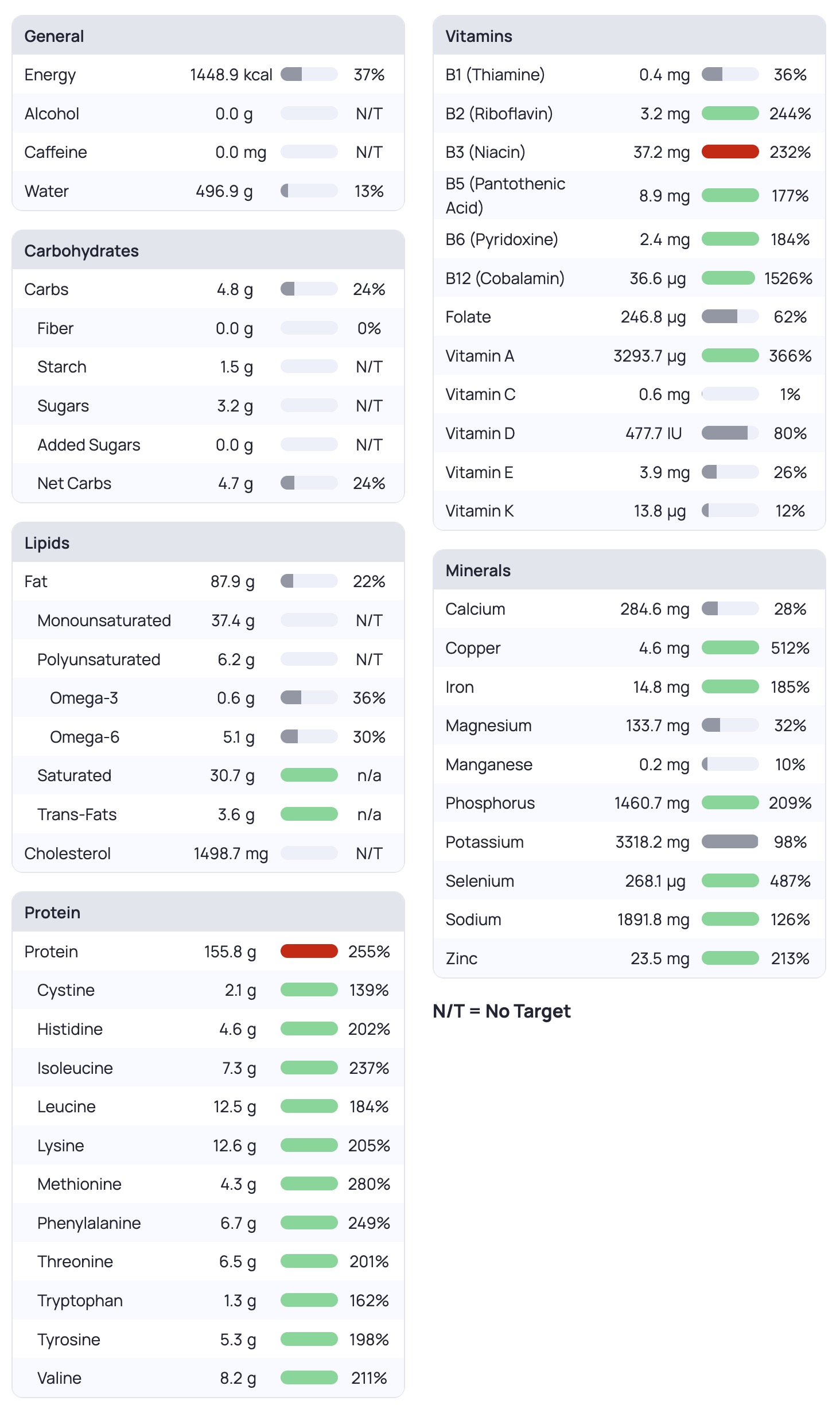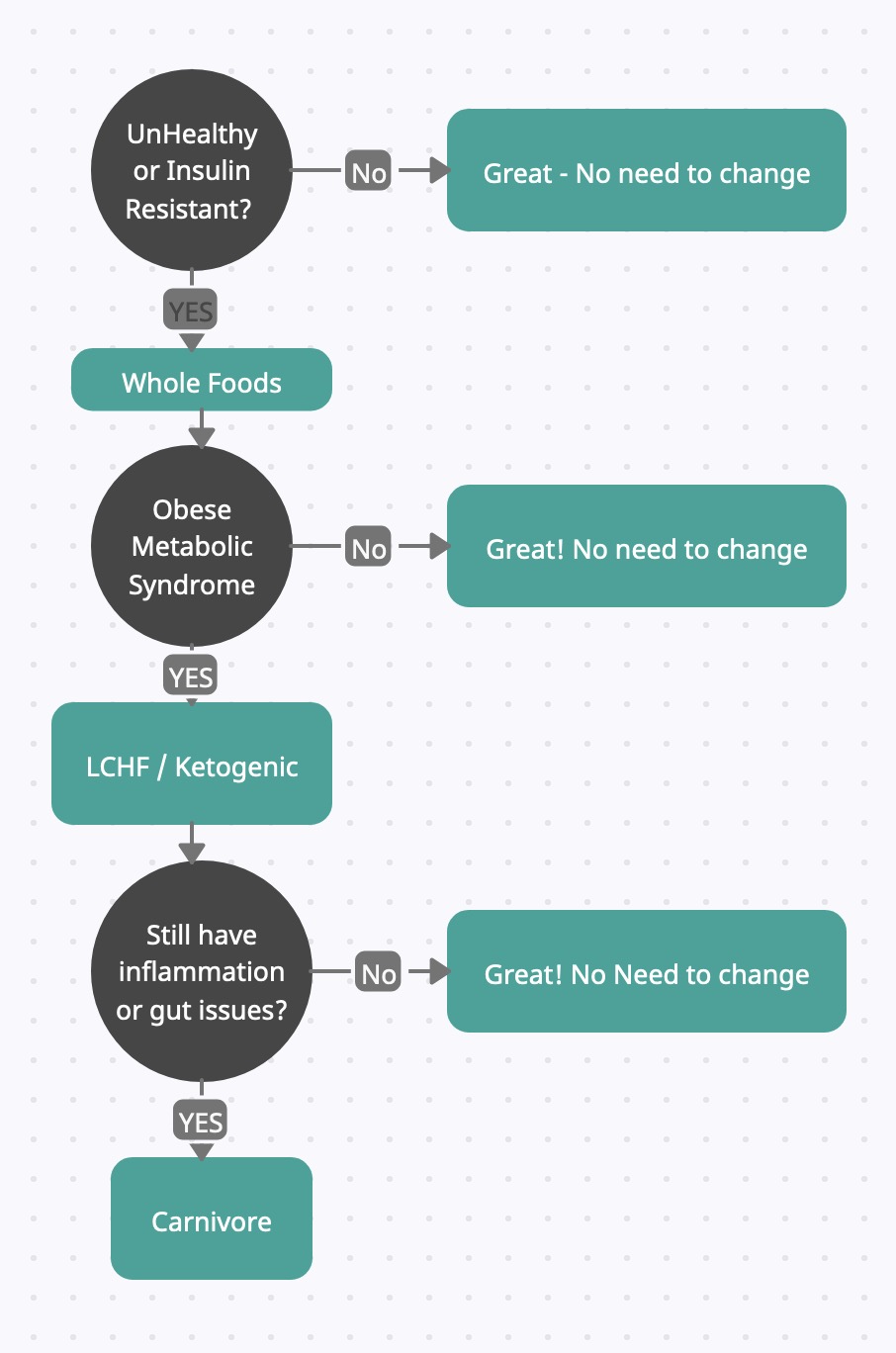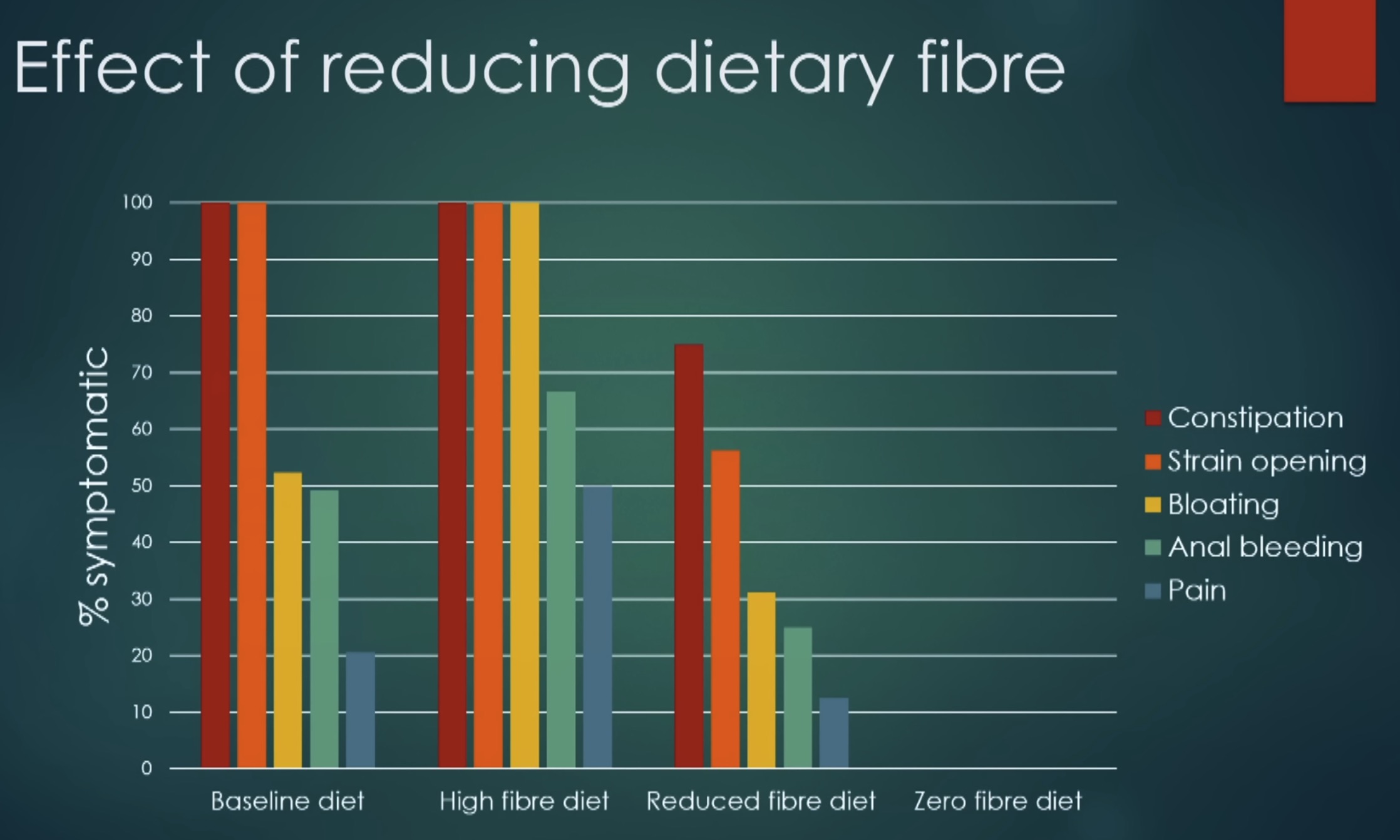- cross-posted to:
- carnivore@discuss.online
- carnivore@lemm.ee
- cross-posted to:
- carnivore@discuss.online
- carnivore@lemm.ee
There are many dietary patterns available and in the zeitgeist.
MacroNutrient
On the macronutrient scale we have 3^3 (27) choices, the most common are:
- HCHFLP - High Carb, High Fat, Low Protein : This is the “standard”/default western diet
- HCLFMP - High Carb, Low Fat, Medium Protein: This is the default “healthy” diet recommended by media
- HCLFHP - High Carb, Low Fat, High Protein: A body builder bulking diet
- MCLFHP - Medium Carb, Low Fat, High Protein: Body builder cutting diet
- LCHFMP - Low Carb, High Fat, Moderate Protein : A diet that maintains the metabolic state of ketosis
MicroNutrients Inside of any macronutrient regime there are essential micronutrients/minerals that are required. Essential means the body does not have the ability to produce them from other sources. There are too many to list here, but using a diet tool like chronometer (free and can use the website) will let you see if your covering your micronutrient targets (Recommend Daily Intakes). One note is that the RDAs are usually minimums (though in some contexts may be more then necessary).
Cronometer example micronutrient display


Importantly, VERY importantly, not all foods are ingested by the human body the same, so the amount on the label is not the same that ends up in the body. This is a good paper discussing the bioavailabilty measurements of food, DIAAS seems to be the best scoring system out there to date.
Whole Foods
Regardless of macro and micro nutrient choices, the evidence, and consensus across medical professionals, and zealots, is that eating whole foods from natural sources that are not industrialized and hyper processed is a good guide to health and better outcomes.
If the ingredients for what you are eating are more complex than the name of the thing, you shouldn’t eat it. Don’t eat food from a factory out of a box and wrapped in plastic!
I.e. shop the outside edge of the grocery store, not the aisles in the middle.
This might be somewhat controversial, but I would include modern seed oils as a type of processed food to be avoided on a Whole food Diet. No vegetable oils that come from a factory please!
Low Carb High Fat / Ketogenic
The LCHF, ketogenic/keto/atkins, macronutrient profile has many benefits - Increasing insulin sensitivity and reducing the issues insulin resistance causes (obesity, hyper tension, pcos, diabetes 2, etc).
The key schism of LCHF diets is over the dietary necessity (or lack thereof) of carbohydrates, this well referenced document is a must read for those who are incredulous. There is NO SUCH THING AS AN ESSENTIAL CARBOHYDRATE - the human body can do gluconeogenesis and produce all the glucose it needs from fat.
Sometimes this LCHF diet is referred to a fed-fasting diet, since it maintains metabolic ketosis even when eating.
The core mechanism of action here is allowing insulin levels to return, and stay at, normal levels throughout the day which enables the body - an amazing homeostasis machine - to function properly. The body is full of feedback mechanisms, like hunger, thirst, satisfaction, etc - to stay in optimal bounds.
Being on a LCHF diet is easy to maintain, because you’re not hungry, you can eat as much as you want - you just let your body self regulate.
NOTE - if you are on some medications, such as high blood pressure, and insulin, changing your diet can change the effectiveness of these medications and should be done under medical supervision. Either with your doctor, a metabolic doctor, or a service such as virta. Watch your biomarkers when you change a diet to make sure your medications are not taking you outside of your targets.
LCHF diets can include Plant based diets (vegetarian/vegan), Animal Based Foods (Carnivore), or any mix in between (just keto, or ketovore)
Insulin Sensitivity
93% of Americans (and probably similar in western countries) have insulin resistance, this can manifest as obesity, or high blood pressure, visceral fat, diabetes, etc. It may not be visible at all - Skinny Fat - Thin Outside Fat Inside (TOFI).
You can use your TG/HDL ratio has a very good approximation for your insulin sensitivity. You want to be <0.9 (mmol/L) or <2 (mg/dL). If your ratio is low, congratulations you are insulin sensitive
Carnivore
Carnivore is a strict subset of a LCHF/Ketogenic diet that restricts itself to only animal sourced foods (ASF). The reasons for doing this can include:
- Better food bioavailability - Need to eat less food
- Inflammation from different plant based foods - oxalate / lectins
- Allergies
- Regenerative and Sustainable farming lifestyle (Local farm can provide biocomplete nutrition without needed to transport rare foods over long distances)
- Ease of adherence (not that many choices, hard to do it wrong, don’t have to count carbs)
ASFs are almost entirely digested in the stomach and large intestine, very little makes it to the small intestine - This is why people eating strict carnivore have less frequent bowel movements, and people with gut issues can see impactful quality of life improvements on this intervention
What should you choose?
Ask yourself what you’re trying to achieve? What issues are you tackling? The only thing that matters in personal health is your personal outcomes. Focus on what works for you, or is specifically sustainable for you.
Weight Loss - Don’t lose weight to get healthy, get healthy to lose weight - A LCHF diet, or even a Whole Food diet, can be used to regain a healthy metabolism
Most of the benefits of Carnivore can be achieved with just LCHF/keto (Even a vegan keto diet). In terms of most effective things you can do, don’t worry about carnivore start with LCHF.
If LCHF/Keto isn’t enough, such as persistent inflammation, or prolonged gut issues, then Carnivore could be a good option for you.
If you’re insulin sensitive, you can keep doing whatever you have been doing - Keep being awesome!

Civility
I’m sure this conversation will touch on people’s passions and triggers, I just ask that when you participate you consider the whole human and speak with each other with compassion and empathy for their choices.
I see you’re quite passionate about the carnivore diet but I’d suggest some adjustments to the diet guide that address key health concerns:
Could you add a section about kidney stone prevention? The carnivore diet significantly increases kidney stone risk due to high animal protein intake, acidic urine, and zero plant-based alkalizing compounds. Studies show 5.9% incidence rate vs 0.25-0.3% in general population: Incidence and Characteristics of Kidney Stones in Patients on Ketogenic Diet: A Systematic Review and Meta-Analysis
Could you include guidance on fiber supplementation? Since carnivore diets provide zero dietary fiber, users miss the 23% reduction in all-cause mortality and 26% reduction in cardiovascular mortality that fiber provides. Consider discussing supplementation strategies: Dietary fiber intake and all-cause and cause-specific mortality: An updated systematic review and meta-analysis
Could you include guidance on digestive health management? Since fiber feeds beneficial gut bacteria and prevents constipation, carnivore dieters may need specific strategies to maintain gut health without any plant foods: Dietary fiber intake and total mortality: a meta-analysis of prospective cohort studies
Could you add a section on micronutrient monitoring? A nutrient analysrt in multiple essential nutrients including thiamin, magnesium, calcium, vitamin C, folate, and potassium (you can even see it in the nutrient table in the guide). Regular blood work and targeted supplementation may be necessary: Assessing the Nutrient Composition of a Carnivore Diet: A Case Study Model
Could you include cardiovascular monitoring recommendations? Given the significant dietary shift, more frequent lipid panels and blood pressure monitoring could help track how individuals respond to higher saturated fat intake, since responses vary considerably between people. Meta-analyses show both processed and unprocessed red meat consumption are associated with increased CVD, stroke, and heart failure risk: Red meat consumption, cardiovascular diseases, and diabetes: a systematic review and meta-analysis and Health effects associated with consumption of unprocessed red meat: a Burden of Proof study
Could you add a section on cancer risk awareness? A comprehensive analysis of 148 studies found red meat increases breast cancer risk by 9%, endometrial cancer by 25%, and colorectal cancer by 10%. Users should be aware of these risks for informed decision-making: Consumption of red meat and processed meat and cancer incidence: a systematic review and meta-analysis
As with most highly restrictive diets there’s lots of bloodwork and supplementation required to make sure you don’t damage your body long term and while it may be much harder than having a more varied diet it may be useful if you don’t have any other choice.
Thanks for generating the list! Seems very organized. I welcome these discussions, just in the future could you break out each point into a individual post and make it into the community so we can have a detailed discussion. Throwing lists around tends to drown out the details and nuance. I’ve done my best below.
Could you add a section about kidney stone prevention?
Carnivore is not keto, the vast majority of kidney stones are oxalate based, without plants the oxalate levels will go down reducing the risk of kidney stones.
Could you include guidance on fiber supplementation?
Could you include guidance on digestive health management?
Fibre is 100% not required in human nutrition. Many people can eat fiber without issues, but it is not a essential nutrient. The only RCT I’m aware of on Fibre involves the total resolution of gut issues.
slide on Fiber intake and constipation

Here is a case study one of carnivore’s gut health
Could you add a section on micronutrient monitoring?
Humans have been eating animal sourced food for at least 2.5 million years, we can derive all nutrition from that food. If someone is worried they can obviously monitor, but it isn’t required.
There is open debate about different required vitamin levels on a ketogenic metabolism.
Could you include cardiovascular monitoring recommendations? … Meta-analyses show both processed and unprocessed red meat consumption are associated with increased CVD, stroke, and heart failure risk
I strongly, and politely, disagree with this entire premise. The majority of epidemiology against meat is done in a carbohydrate metabolic context, carnivore is a ketogenic metabolism, even then the associations are small and the relative risks are not clinically significant (HR < 2) https://www.dietdoctor.com/low-carb/red-meat#heart-disease
However, that said, I would welcome all people on any diet to periodically (every 5 years?) get calcium monitoring to see if they have developed atherosclerosis - which is the real concern.
Could you add a section on cancer risk awareness?
Again - I disagree with the premise for the same reasons above.
The majority of epidemiology against meat is done in a carbohydrate metabolic context, carnivore is a ketogenic metabolism, even then the associations are small and the relative risks are not clinically significant (HR < 2)
https://www.dietdoctor.com/low-carb/diet-and-cancer
This is a totally different metabolism, removing the single biggest risk factor for cancer - elevated glucose levels has a massively outsized impact greater then any of the weak associations indicated above.
As with most highly restrictive diets there’s lots of bloodwork and supplementation required
This premise isn’t correct, humans coevolved for 2.5 million years eating meat - no supplementation is required.
Thanks for the feedback, I’m comfortable keeping my decision tree intact as is
Fantastic meta-resource with links to everything
Great resource on the sustainable ecology of carnivore
https://www.meatrition.com/meat-sustain
I’m happy to have a discussion and answer any questions, as long as the conversation is civil and both parties are thoughtful and considering the other persons words and content. Just throwing a wall of talking points up isn’t going to help anyone, especially if the response to counter points is repeating the talking points but in a different order.
The Science behind Carnivore
The sad truth is there is very few studies of Carnivore nutrition. What we do have is very scant:
- Published Observational Data https://hackertalks.com/post/5717714
- Classic 1930’s study of a pure carnivore diet for a YEAR in super controlled conditions https://hackertalks.com/post/5692899
Other then that, its almost totally absent.
Poor Science transfer to different metabolic states
Numerous people will try to conflate observational data against meat in general to carnivore. While I don’t think the anti-meat studies are strong science, observational and no RCTs, weak hazard ratios, etc… That is moot anyway because… Carnivore is a from of a LCHF/Ketogenic diet - which is a radically different metabolism from the “normal standard diet”. We have to evaluate the effect of plants, nutrition, minerals, etc in the context of a ketogenic metabolism (the human traditional metabolism).
Dietary Guidelines
Carnivore does not hit Dietary guidelines (especially Vitamin C). The question if the Guidelines are the peak health requirements, again need to be in the context of a ketogenic metabolism. Many dietary guidelines were not established by RCT science, but by observing dietary patterns of “healthy” people… in the context of a high carbohydrate glycogenic metabolism. In fact many of the Recommended Daily Minimums are not set for optimum health but by the level required to avoid a specific medical conditions (i.e. iodine and goiters).
Summary
Carnivore has weak mainstream support, and very weak scientific literature, but no contraindications. It is sustainable as identified in the year long study above, and carnivore populations of humans before they westernized. Is it the optimal diet for human health? We don’t have the hard data.
Personally I think Carnivore is a option if you are having trouble, but it should be considered a more adventurous option where you have to pay close attention to your nutrition and health. You will see 90% of the benefit by just doing a LCHF/Keto diet, and if that isn’t enough THEN try Carnivore.
I’m happy to have a discussion and answer any questions, as long as the conversation is civil and both parties are thoughtful and considering the other persons words and content. Just throwing a wall of talking points up isn’t going to help anyone, especially if the response to counter points is repeating the talking points but in a different order.


